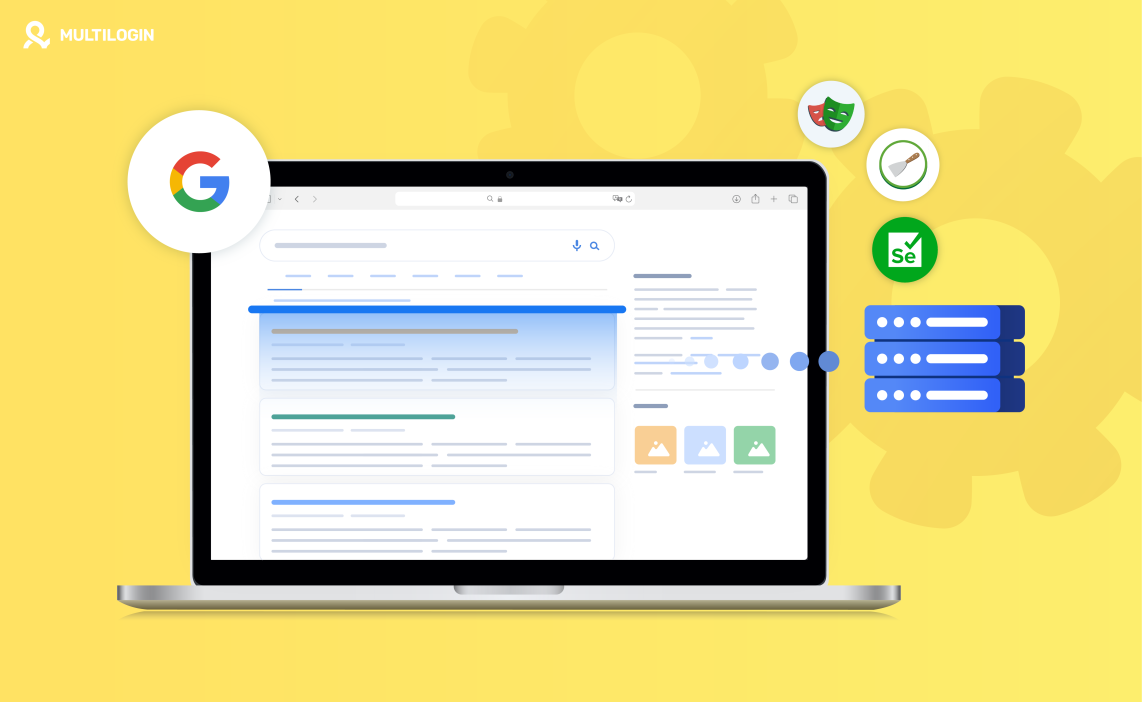Nowadays, more and more businesses use web scraping to gather helpful data. The information received from web scraping allows them to enhance their marketing strategies and success in their field. Data-driven decisions lead to effectiveness, companies can use this data for market research, competitor analysis and more.
One of the most popular methods businesses use is web scraping Google results. By extracting data from search results pages, companies gain valuable market insights. For example, tools like the Google Local SEO Checker make it easy to analyze local rankings and discover new opportunities without manual work.
If you want to learn more about web scraping Google results and how it can help you to succeed, continue reading.
Importance of Web Scraping Google Results
Web scraping Google focuses on gathering information like URLs, local listings, ad data, addresses, contact details, etc. Businesses must use this tool to get valuable data and use it for different purposes.
Web scraping Google results is important for several purposes and here is a list of the reasons why it is essential:
Market Research
With the help of web scraping Google results businesses can collect data about their competitors. The information they can collect includes rankings, content, etc. This type of data allows businesses to enhance their marketing strategies, change or create new campaigns and succeed in a competitive landscape.
Web scraping allows companies to get the information about customer interests. Analyzing Google results can help them to identify upcoming trends. Following the trends is essential for businesses as it leads to more customers engaging with the product.
SEO Optimization
Web scraping Google results gives you the ability to track keyword performance. It can inform you about the things that need to be fixed.
After you make changes to your SEO strategies based on the scraping results, you will be able to see that the search visibility improved.
Lead Generation
Web scraping is helpful for lead generation as well. Scraping Google results can help you to gather data like names, addresses, phone numbers, websites, etc. This information can be used for enhancing marketing efforts.
Product Monitoring
Web scraping Google results allows businesses to see competitor pricing strategies. Companies use this data to stay competitive. For example, they adjust their prices according to their competitor which helps them to succeed.
As you can see, web scraping Google results can be a useful tool for enhancing your strategies. Effectively using scraping can lead to increased efficiency.
How to Extract Google Results?
Here is an ultimate guide to extract Google results:
Step 1: Using Google Search APIs
To get access to search results within Google’s terms of service, you must use Google Custom Search API.
Step 2: Using Web Scraping Tools
Web scraping tools are used for extracting Google results. There are many tools available like Selenium, Beautiful Soup, Scrapy, etc. You must choose the one that meets your needs the most.
Step 3: Set Up a Script
Sending requests to Google requires writing a script in a programming language like Python. You must use libraries Beautiful Soup for parsing as well.
Step 4: Try Avoiding Detection
Web scraping can be easily detected. You must ensure that your activities are not tracked. Try to rotate IP addresses to avoid detection. Also try not to send too many requests as it can lead to getting blocked by Google.
Step 5: Store and Analyze Data
After collecting the data, you must store it in a structured format. Analyzing data requires having a clear strategy. Using web scraping effectively leads to data-driven decision-making.
The thing you must consider while web scraping Google results is Google’s terms of service. You must pay attention to the legal part to ensure that your activities are not illegal.
6 Best Scraping Tools for Google Results
Web scraping requires using different tools.
Here are 6 best scraping tools for Google Results:
1.Playwright
Playwright is one of the most used tools for web scraping. It is a library for browser automation.
Pros:
- Supporting various browsers
- Available on different systems like Windows, macOS and Linux
- Built-in wait features
Cons:
- Setting up process can be complex
2.Beautiful Soup
Beautiful Soup is a Python library. It is used for parsing HTML and XML documents.
Pros:
- User-friendly interface
- Easy to use for parsing HTML and XML
- Can deal with small and medium-sized scraping tasks
Cons:
- Requires coding knowledge
3.Selenium
Selenium is an automation tool. It allows users to scrape dynamic content.
Pros:
- Supports various browsers
- Can scrape content generated by JavaScript
- Manages cookies
Cons:
- Setting up process can be more complicated compared to other tools
4.Octoparse
Octoparse is a web scraping tool. Its user-friendly interface allows users to scrape easily.
Pros:
- User-friendly
- Coding is not required
- Requires minimal technical skills
Cons:
- Free version has limitations
5.ParseHub
ParseHub is one of the most popular data extraction tools. It enables users to scrape data without coding.
Pros:
- Easy to set up
- Handles large data extraction
- Knowing coding is not required
Cons:
- Slow performance with large datatest
6. Scrapy
Scrapy is a Python framework that is used for large-scale scraping. It allows users to manage requests and handle data.
Pros:
- Used for large-scale scraping
- Strong community support
Customizable settings
Cons:
- Requires programming knowledge and can be hard to use for beginners
Choosing the right tool for web scraping Google results is challenging. Keep in mind that the tool you will use must make your experience convenient and meet your needs.
What is the Best Way to Scrape Google Results?
Companies use a lot of strategies and methods to effectively scrape Google results. Here are some of the best ways:
1.Use Google’s Custom Search API
Web scraping can violate Google’s terms of service, and it can lead to you being flagged. To avoid this, you must use Google’s custom search API, set up an API key and collect data.
2.Avoid Detection
Web scraping Google results contains risks like getting banned or blocked. To avoid this, you must use proxies to rotate IP addresses.
3.Limit Requests
One of the ways to effectively scrape data without getting banned is limiting requests. Not sending too many requests allows users to continue their scraping journey and use collected data for scaling business.
4.Focus on Specific Data
While scraping Google results, you must identify what kind of information you are looking for. Search for the specific keywords that are related to your business. These results will help you to get insights and improve your marketing strategy.
5.Storing Data
Storing data in a structured format is beneficial. These formats can include CSV, databases, etc. Structured data is easier to analyze and manage.
6.Stay Updated
Staying updated is essential for web scraping Google results. Time to time, websites change, and it can affect your scraping process.
Being aware of these changes allows you to adjust your methods and effectively manage your activities.
It is important to pay attention to Google’s terms of service. Ignoring legal part can lead to account suspension and other problems.
Always try to avoid common mistakes like ignoring terms of service and scraping irrelevant data. Monitoring and managing data will help you to successfully scrape Google results.
How Multilogin Can Help with Web Scraping Google Results
Web scraping process can be detected and businesses can face problems like being flagged. Using anti-detect browsers like Multilogin is essential for avoiding rate limits and getting blocked.
Multilogin masks and alters your digital fingerprints and allows you to create and manage multiple accounts. Masking and altering user agent and IP address prevents users from getting blocked as it looks like that the activity comes from different users.
Multilogin also offers seamless integration with Selenium, Playwright and Puppeteer. This way you can automate data extraction and keep your activity invisible for anti-automation bots.
One of the problems people face while web scraping is that platforms can’t support high loads. With the help of Multilogin you can scale your scraping operation to any size.
Multilogin mimics human behaviour and allows you to manage browser profiles. These features help you to avoid detection and successfully scrape Google results.
What are the Risks of Web Scraping Google Results?
Web scraping is a helpful tool for businesses to succeed but you must be aware of the several risks it carries.
Here are some of the risks associated with web scraping Google results:
Legal Issues
You must pay attention to the legal part. Violating Google’s terms of service can lead to legal action.
Getting Banned
Web scraping can be detected so there is a risk of getting blocked by Google.
Data Accuracy
Sometimes scraped data may not be accurate or up-to-date. You must make sure that you scrape relevant information that can be used for your goals.
CAPTCHAs
One of the risks of frequent requests is triggering CAPTCHAs. You must try to limit the frequency of the requests to avoid detection and any other threats.
Frequently Asked Questions About Web Scraping Google Results
Does Google allow scraping search results?
No, Google does not allow scraping search results according to its Terms of Service. However, Google offers its API, which can be used for scraping data in a compliant manner.
How to scrape Google Search Results without getting banned?
If you want to avoid detection and getting banned while web scraping Google search results, you must use tools like Multilogin. Anti-detect browsers help you to gather data without being flagged as it masks your digital fingerprints.
Can web scraping be detected?
Yes, there are many methods websites use to detect web scraping. To minimize detection, scrapers use different techniques and tools like anti-detect browsers.
Conclusion
In conclusion, web scraping Google results is a powerful tool for gathering relevant data. It can be beneficial for gaining insights, creating marketing strategies and so on.
Affectively using web scraping is helpful for companies to succeed but you must pay attention to legal part to avoid any threats.



